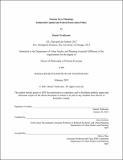Patents over planning : industrial capital and federal innovation policy
Author(s)
Traficonte, Daniel (Daniel Martin)
Download1265296402-MIT.pdf (2.151Mb)
Other Contributors
Massachusetts Institute of Technology. Department of Urban Studies and Planning.
Terms of use
Metadata
Show full item recordAbstract
In recent years, scholars from a range of disciplines have analyzed the collective set of federal R&D programs as a high tech-oriented industrial policy through which the US government actively targets certain economic sectors over others for state support. Analysts have emphasized one dominant institutional feature of this system: federal R&D programs lack a central planning mechanism, and are instead highly fragmented and ad hoc. While some analysts have interpreted this institutional structure as a strength, others view the absence of R&D planning as a major shortcoming, a view shared by policymakers advocating for increased coordination of federal R&D programs in order to help combat economic and environmental challenges. This study examines the origins and institutional evolution of federal innovation policy, and in doing so, probes possibilities for future reform. My account focuses primarily on the business-state nexus as an explanatory factor, emphasizing the role of politically active industrial firms in shaping the system's legal and institutional structure. I argue that R&D-based industrial firms were opposed to proposals for R&D planning, but only insofar as these proposals also threatened a separate institutional feature to which these firms were more firmly committed: the transfer of patent rights resulting from government-led R&D projects into private hands. During the New Deal and into the immediate postwar period, the link between patent reform and innovation planning prompted industrial firms to lead the attack against progressive calls for a more coordinated R&D system. When government patent policy became decoupled from planning during the Space Race and eventually led to a new consensus on "technology transfer," industrial firms shifted in favor of R&D planning but by that time saw their political influence substantially reduced. The neoliberal business coalition lobbied instead for increasingly fragmented one-off programs to promote specific high-tech fields--a "hidden developmental state" that would remain intact until the present. From this perspective, the structure of the federal R&D system is more a result of a conflict over property than over planning, and the institutional link between coordination and government patent policy may frustrate future attempts to finally realize planned innovation in the US.
Description
Thesis: Ph. D. in Political Economy, Massachusetts Institute of Technology, Department of Urban Studies and Planning, February, 2021 Cataloged from the official PDF of thesis. Includes bibliographical references.
Date issued
2021Department
Massachusetts Institute of Technology. Department of Urban Studies and PlanningPublisher
Massachusetts Institute of Technology
Keywords
Urban Studies and Planning.